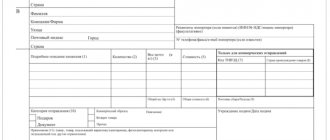When conducting illegal work, penalties are provided: a fine for trading without registering an individual entrepreneur and deprivation of the opportunity to do business.
Throughout his life, at least once a person has had to sell some of his personal belongings. For example, when selling old furniture, it cannot be said that a person is engaged in entrepreneurial activity. If we consider another example, when a purposeful search is carried out for old furniture with further sale, this is recognized as entrepreneurship and the work is subject to mandatory registration with the federal tax service. Engaging in business without registering as an individual entrepreneur entails liability.
Signs of entrepreneurial activity
Every person can sell something or provide services. Such actions do not fall under the definition of “Entrepreneurial activity” if they are unsystematic in nature. For example, a person who sold an unnecessary tape recorder to a neighbor, and five years later sold a toaster to a relative, is not considered an entrepreneur.
If he constantly sells household appliances, purchases goods from wholesalers, places them in the store, and draws up order schedules, this is obviously a commercial activity. This applies to selling goods on the street, through social networks or in other ways.
Entrepreneurship is considered to be the following activities:
- aimed at making a profit;
- one that occurs more often than 2 times during the year.
Also noteworthy are the following actions:
- constant purchase of materials, feed or goods for subsequent sale;
- drawing up a sales schedule or order fulfillment;
- presence of a permanent client base;
- advertising, creating groups on social networks.
Such actions indicate that a person is operating as an individual entrepreneur without a certificate. Such a person will attract the attention of the tax inspectorate, especially if he has received a complaint from other people (acquaintances, clients, neighbors) about violation of the law. Such a citizen may be fined for trading without an individual entrepreneur certificate.
Taxation and reporting on street trading
Retail street trading can be translated into:
1. UTII
. In this case, the object of taxation is a retail location. The physical indicator will be the number of retail spaces measuring up to 5 square meters. m. For example, the basic profitability indicator is 9,000 rubles. Then the monthly tax amount is 540 rubles per retail space (9000*6%). This amount is approximate and requires adjustments by the deflator coefficient and the K2 coefficient, which is established by regional legislation.
UTII requires quarterly payment, the tax return is submitted simultaneously with the payment of the tax. To switch to UTII, you must submit an application to the tax office to register a legal entity as a UTII payer. Transferring wholesale trade to UTII is not possible.
2. Patent tax system
. To apply for a patent, you must submit an application-request for it. A patent is issued for a period from a month to a year. Payment can be made in several ways. If the patent is valid for up to six months, it must be paid within 24 days from the date of validity.
For a longer period, a third of the cost must be paid in the first 25 days, the remaining amount must be repaid a month before the end of the year. The cost of a patent for each type of trading activity is established by legislation in force in the region. This taxation system does not provide for tax reporting; it also does not apply to wholesale trade.
3. Simplified taxation system
. Due to the fact that the transition to USTV is now voluntary, retail trade can be taxed under a simplified system. In this case, the most effective would be to choose an object of taxation for trade on the principle of “income minus expenses.”
The frequency of filing a tax return is once a year, and the amount of tax is calculated based on the actual income received. Also, advance payments are required throughout the year, and the tax itself is repaid at the end of the year. The disadvantage of using “simplified” is the need for a cash register.
What is needed to open and maintain a bank account for an entrepreneur:
Damage from illegal activities
Commercial activities without appropriate registration cause serious harm to the state, since it does not receive the necessary finances in the form of taxes.
People working for such entrepreneurs also cannot exercise and protect their labor rights, since they are not officially employed. An entrepreneur without registration does not have work experience, he will not have the confidence of banks when lending. If illegal activity is detected, the person will have to bear legal responsibility.
On video: How to open an individual entrepreneur from scratch
What you need to know about IP
For their part, supervisory authorities, before imposing this or that penalty, must also prove that a particular citizen conducted business activities. However, this can only be done in one case - if there is irrefutable evidence:
- the systematic nature of the above act;
- regular income generation.
The law clearly defines that permanent business activity is indicated by carrying out relevant actions more often than twice a year.
An individual who, once during the previously mentioned period:
- provided this or that service;
- sold a certain product;
- did some work.
In addition, if a citizen regularly sold something during the calendar year, but did not make a profit (that is, sales were carried out at purchase prices or lower), he is not an entrepreneur by law, since he does not receive a profit.
Tax liability
Tax liability is provided for carrying out illegal business. What is the fine for trading without an individual entrepreneur certificate?
Article 116 of the Tax Code of the Russian Federation establishes two types of offenses:
- Violation of the deadline for registering your activities. The fine is 10 thousand rubles.
- Evasion of registration as an individual entrepreneur and at the same time conducting commercial activities. The entrepreneur will have to pay 10% of the amount of revenue received, but not less than 40 thousand rubles.
Responsibility for work without registering an OKVED code
Activities without registering an OKVED code are fraught with problems. At best, a warning will follow immediately. The amount of the fine reaches 5.0 thousand rubles. When tax authorities detect that activities are being carried out using an unregistered code, they may refuse compensation for value added tax and even block the current account until the fine reaches the treasury.
If an individual entrepreneur with the simplified tax system works legally, but without registering a code, he can:
- translate to OSNO;
- additionally accrue personal income tax that was not paid previously;
- impose a fine for data violations in reporting.
The individual entrepreneur must report changes in activities and work under a different OKVED code within five days.
Example 1. An individual entrepreneur worked with a registered OKVED code. In his subsequent activities, he engaged in other areas of business, attracting additional labor, without having the appropriate OKVED. The fact was revealed by the tax authorities. As a result, the individual entrepreneur had to give 5.0 thousand rubles to the treasury. fine and 4.0 thousand rubles. Personal income tax.
Administrative responsibility
As part of administrative legislation, a businessman will have to pay a fine for trading without registering an individual entrepreneur. The amount of liability is determined by Article 14.1 of the Code of Administrative Offenses of the Russian Federation. The annual fine for trading without registering an individual entrepreneur ranges from 500 to 2000 rubles. If the activity being carried out is subject to licensing, the amount of liability increases.
What is the fine for trading without an individual entrepreneur and without a license? For such an offense, an individual will be required to pay a fine of 2,000 to 2,500 rubles. The authorized bodies also have the right to confiscate the products being sold and the tools for their production. As you can see, an entrepreneur can suffer colossal losses.
In the Republic of Belarus, liability is also provided for illegal activities. The fine for trading without registering an individual entrepreneur is 100 basic units, i.e. 21 Belarusian rubles or 631.86 rubles. (Article 12.7 of the Code of Administrative Offenses of the Republic of Belarus).
Administrative liability occurs if the entrepreneur’s actions do not contain signs of a crime. Along with the fine, the entrepreneur's belongings and equipment will be confiscated, even if it does not belong to him.
In Ukraine, a citizen must pay a fine for trading without registering an individual entrepreneur per year in the amount of 1,000–2,000 taxable minimums, i.e. 17,000–34,000 UAH. (approximately RUB 38,335–RUB 76,671).
Additional liability for violation of individual entrepreneur trade rules
Violation of established trade rules is considered as deception of buyers. For certain types of it, administrative responsibility is provided:
| Type of violation | Responsibility |
| Absence: | |
| price tags, including their incorrect design | 3.0-5.0 thousand rubles. 300-1500 rub. |
| excise stamps | 2.0-4.0 thousand rubles. + confiscation of goods |
| licenses | 2.0-50.0 thousand rubles. |
| punched check | Minimum 10.0 thousand rubles. Repeated violation – suspension of activities for up to three months |
| health book | 100-500 rub. |
Mandatory registration of a trademark is not provided for by law. The entrepreneur decides independently whether to carry out such a procedure or do without it. But the use of someone else's registered trademark entails damages, payment of compensation to the party who owns it.
Criminal liability
Criminal liability is the most severe type of legal liability . It is usually used for significant offenses. The actions of the entrepreneur are qualified as a crime for causing large (2.25 million rubles) or especially large damage (9 million rubles) to the state.
What fine for trading without an individual entrepreneur is regulated by criminal law?
The punishment for causing major harm is:
- fine up to 300,000 rubles;
- two-year salary of the convicted person.
In addition to financial liability, a citizen may be subject to correctional labor or arrest.
If an entrepreneur caused damage on a particularly large scale or was engaged in illegal business with other persons, then the liability will be significantly higher:
- fine 150–500 thousand rubles. (or income for 3 years);
- forced labor or imprisonment with the simultaneous collection of a fine.
Services provided without opening an individual entrepreneur
A fine for the work of an individual without an individual entrepreneur in 2020 is not provided for the following areas (based on the tax law that came into force in January 2020):
- tutoring services;
- babysitting services for children;
- care for elderly citizens;
- cleaning of residential premises;
- household.
The listed services are provided by the citizen personally, without hiring additional employees. A complete list of such areas can be found in the Tax Code, Article 217. At the legislative level, local and regional authorities are allowed to make amendments. For this purpose, a corresponding law is adopted.
An entrepreneur is relieved of the obligation to pay tax on income received. Individuals do not have to worry about being held liable for work without a registration certificate.
There is a requirement that all future entrepreneurs adhere to. When providing services in one of the areas that exempts you from the obligation to register a business, you will need to notify the Federal Tax Service about this. The book of expenses and income is kept at the discretion of the entrepreneur.
When can you do without registering an individual entrepreneur?
A person can carry out retail trade without an individual entrepreneur.
A fine will not be imposed in the following cases:
- sale of flowers - provided that trade is carried out in markets under an agreement with its administration;
- sale of own-produced products (grown vegetables, honey, food preparations, baked goods) - subject to their sale at a specially organized fair.
In the above cases, the seller does not face fines for trading without an individual entrepreneur.
On video: Vladislav Korochkin: The article “Illegal entrepreneurship” should be removed from the Criminal Code
Illegal sale of goods
According to Russian law, trading without registration as an individual entrepreneur is strictly prohibited. This applies to the sale of handmade items, vegetables from your own garden, and spare parts from your own car. Unauthorized trade precisely means a situation where entities operate without registration as individual entrepreneurs or in another form.
In order to receive it, you need to register with the tax service. The latter assigns the corresponding status of an entrepreneur or economic entity. Before this, he must choose a taxation system. Once official status is obtained, unauthorized trade can no longer be attributed to it.
However, it must be taken into account that some types of unlicensed activities do not require mandatory registration. For example, selling flowers at retail or small wholesale. To trade them, you only need an agreement with the administration of the retail outlet or market. However, this way you can only sell small volumes of goods.
The concept of illegal trade includes the sale of any goods and provision of services that are considered illegal, promote hatred or discrimination against people, violate copyrights, or offend accepted moral standards. You cannot legalize the sale of such products by registering with the tax service.
The main difference is that unauthorized trade involves the sale of completely normal products and services. They are not considered illegal, do not violate anyone's copyright, and do not promote hatred or discrimination against people based on gender, ethnicity, race or social status.
Do foreigners need an individual entrepreneur?
Foreign workers coming to Russia for income must have a work permit. The individual entrepreneur is obliged to notify the federal migration service within three days from the date of signing the employment contract with the foreigner. Otherwise, the FMS issues a fine to the negligent employer for illegally attracting a foreigner (Article 18.15 of the Code of Administrative Offenses of the Russian Federation). Recovery varies from RUB 25,000 to RUB 50,000. In Moscow, St. Petersburg and the region, for each unregistered foreign worker you will have to pay from 35,000 to 70,000 rubles. fine
Illegal trade: what is it, consequences
Russia is pursuing an active policy aimed at combating illegal business. The fine for illegal trading on the street is provided for by three codes at once, however, grandmothers, migrants, and passing traders set up their points of sale every day without permission and in unidentified places.
We invite you to read: Doctors cannot make a diagnosis: where to go and what to do, responsibility for an incorrect diagnosis
Illegal outlet.
Any activity aimed at systematically generating income through the sale of goods or services is entrepreneurship. According to Art. 34 of the Constitution of the Russian Federation, every citizen has the right to engage in entrepreneurial activity. The Civil Code contains a provision containing the conditions under which trading is permitted.
In Art. 23 of the Civil Code of the Russian Federation states that an individual has the right to engage in business after he registers with the tax office as an individual entrepreneur or legal entity.
The Administrative Code and certain regional acts provide for a fine for unauthorized trade in the amount of 500 to 2000 rubles. This liability is regulated by Article 14.1 of the Code of Administrative Offences. If goods subject to mandatory licensing are sold, the fine for street trading can range from 2,000 to 2,500 rubles. In this case, all products are subject to confiscation.
The most severe punishment is provided for in the Criminal Code of the Russian Federation. In Art. 171 of the Criminal Code of the Russian Federation states that illegal business, if it has caused damage to citizens or the state, is punishable by a fine of up to 300 thousand rubles or in an amount equal to double income for the year. Also, the convicted person may be subject to forced community service for a period of up to 480 hours.
If the damage is caused by a group of people or on a particularly large scale, they may be fined up to 500 thousand rubles or subject to community service for a period of 5 years. Imprisonment for up to 5 years is possible, then a fine for trading without an emergency will need to be paid in the amount of 80 thousand rubles.
The Tax Code also provides for penalties for illegal trade. According to Article 116 of the Tax Code of the Russian Federation, for violating the rules and deadlines for registration, you will have to pay 10 thousand rubles. And the fine for unauthorized trading on the street for individuals who do not intend to register their activities will be 10% of the profit and not less than 40 thousand rubles.
The sale of goods by an individual is a business activity that requires obtaining the appropriate status. Even if trade is carried out in a spontaneous market, it is a business. Russian legislation regulates the obligations of citizens who receive profit from commercial activities to register as a business entity. Additionally, you will need to obtain permits for trade activities and for the start of work from the fire inspection authorities and Rospotrebnadzor.
Registered individual entrepreneurship obliges the citizen to keep reports on the activities carried out and the profit received from it. At the end of the reporting period, he must submit income declarations, as well as transfer mandatory payments to allocated budget accounts. Maintaining strict reporting and applying high rates to income and wages of employees when calculating taxes and other contributions makes it unprofitable to have a registered entrepreneurial status for persons whose income is not large.
For this reason, selling on the street without a permit is a thriving business. However, citizens selling on the street do not register their activities and therefore do not have the right to sell their products. By working according to this scheme, they violate the law, for which they can be brought to administrative, tax or criminal liability.
If during the audit it is revealed that the profit exceeded the mark of 1,500,000 rubles, then the person will be brought to criminal charges. Tax liability is relevant if inspectors record the fact of conducting activities without registering a business, if such actions are a mandatory requirement of the law applicable to a specific situation.
It is worth noting that in some situations, business registration is not necessary. To conduct business, it may be sufficient to obtain a trade permit. For example, in order to sell flowers, it is enough to draw up an agreement with the administration of the trade establishment on whose territory the activity is planned.
The law contains a number of provisions that prohibit trade in certain goods and services with certain characteristics. The seller may get into trouble if they sell infringing products that are found to be illegal or require licensing. The product offered for sale must not discriminate against individuals or offend moral principles.
Administrative
If during the inspection it was revealed that an individual is engaged in commercial activities without obtaining the appropriate registration, then after litigation he will be assessed a fine for illegal trading on the street, the amount of which is 500–2000 rubles. The specific amount of recovery is determined in accordance with the volume of informal business and the amount of profit received, which is calculated on the basis of potential values.
We invite you to familiarize yourself with the Sample Minutes of the general meeting of premises owners on the choice of method
If during the inspection it was revealed that the seller does not have permits or licensing documents that could confirm the legality of his trading activities, then a fine of 2000-2500 rubles will be imposed on the individual. If the merchant is registered as a legal entity, then he will be subject to a fine of 40,000–50,000 rubles.
Penalties for the absence of documents at the time of the raid are assessed regardless of whether the documents are completed or not. This fact influences the amount of the fine assessed, as well as the decision to confiscate the goods or apply punishment without such a measure.
The basis for applying a penalty is the completed protocol of the offense. It can be compiled by authorized representatives of regulatory organizations:
- Police.
- Tax Service.
- Fire inspection.
- Rospotrebnadzor.
- Consumer Rights Protection Service.
- State Inspectorate.
- Antimonopoly services.
Criminal
Criminal liability is provided for when it is revealed that a trade activity has been carried out without prior tax registration and without registering a business entity. The situation may be aggravated if it is revealed that the amount of potential income exceeds the mark of 1,500,000 rubles. In such a situation, a fine of 300,000 rubles will be imposed on the illegal entrepreneur.
Tax
Illegal street trading is subject to tax liability when conducting trading activities without tax registration, which implies non-payment of mandatory payments to the state treasury. When such a fact is recorded, the person is required to register as a business entity if he wishes to continue trading activities.
If a person plans to sell any goods, he needs to officially register his business. Illegal trade is subject to administrative, tax and even criminal liability.
The responsibility he will bear depends on the law that a person has violated. For trading without registration, a person will receive punishment in accordance with Art. 14.1 AK. You will need to pay a fine of 500-2,000 rubles. The protocol is usually drawn up by the police or Tax Service officers who discovered the offense. A huge number of people are engaged in entrepreneurship without registration.
If an individual entrepreneur or LLC conducts business without tax registration, then in accordance with Art. 116 of the Tax Code, you will need to pay a fine of 10 thousand rubles, as well as 10% of your earnings. If the business has been registered, then first of all you need to start keeping tax records to avoid penalties.
Selling drugs or products harmful to human health can result in serious penalties. For example, for selling narcotic drugs a person is sent to jail for 7-15 years.
Every entrepreneur should be aware of the responsibility that he will bear in case of violation of laws. Under no circumstances should criminal laws be violated. The punishment for any crime provided for by the Criminal Code is much harsher. Large fines are paid or the person is sent to prison.
Fine for trading in the wrong place
A fine for trading in the wrong place and without special permission from the administration can be issued by tax officials, representatives of law enforcement agencies or the federal service for supervision in the field of consumer protection (Article 28.3 of the Code of Administrative Offenses of the Russian Federation).
In many cities, street trading is strictly suppressed. Moscow and the Moscow region have been struggling with this problem for many years. Here, trading near the metro is commonplace. The city's Department of Trade and Services is waging a persistent fight against illegal businesses, connecting to it a video surveillance system. Today, unauthorized entry into trading can lead to great financial troubles.
Trading from a machine
In each locality, special places are allocated for trade. To work in them you must obtain permission from the administration. Here the authorities provide proper sanitary conditions for conducting commercial activities. But even when trading in a designated place, the seller is obliged to prepare the necessary documents, otherwise he cannot avoid a fine from the criminal and tax inspectorates.
In the event of an official inspection, unauthorized trading may be fined from 500 to 2,500 rubles. Its final value is determined by a court ruling.
Grounds for the fine
Fine for not wearing a vest in the car
No one has the right to impose an unreasonable fine. Documentary evidence of illegal activities is required, which is established by authorized bodies: police, tax inspectorate, Rospotrebnadzor, antimonopoly service, public organization for the protection of consumer rights.
Tax inspector
They have the authority to draw up a protocol on the offense in accordance with Art. 28.4 of the Code of the Russian Federation on Administrative Offences. Representatives of official structures on site collect evidence through test purchases or other activities.
A businessman who has not presented registration documents must give written explanations. The auditors draw up an act and a protocol, copies of which are handed over to the other party against signature. The documents are sent to the local court, which after 2 months makes one of two decisions: to bring the person to administrative responsibility or to find him not guilty.
The judge's verdict can be appealed to the Arbitration Court within 10 days if the accused believes that the inspection was carried out with violations. However, such behavior will only delay the period of reckoning, because working and receiving income without registering a business is prohibited by law. You will have to be punished and pay a fine for not having an individual entrepreneur in 2020.
What is more profitable - to follow the rules or not?
Illegal entrepreneurs often believe that it is too expensive to register their activities legally. While penalties may not be applied if the work is carried out correctly.
But law enforcement officials are working very harmoniously in this direction. They can not only detect the fact of illegal trade, but also collect evidence. Even if it is not possible to bring a person to justice, a lot of nerves will be expended.
The seller may be surprised by the fact that a simple buyer can complain about him to the competent authorities. Then there will be no need to explain why the entrepreneur did not register his activities. After all, the investigation into the violation will begin.
To officially acquire the status of an individual entrepreneur, it is enough to pay a state fee of 800 rubles. This amount is significantly lower than the fines that can be imposed when illegal actions are detected. In this case, you will not need to worry every day that the fact of a crime may be discovered.
If you don’t want to collect documents and submit them to the tax authorities for registration, you can hire specialists who will do everything for the client for a fee. Moreover, payment for their services will also be significantly lower than the fine.
In addition, an entrepreneur who has received a registration certificate has the opportunity to:
- open a bank account;
- take part in the tender;
- take out a loan to expand your activities.
Entrepreneurship is counted as work experience.
Before making a decision, you need to consider all the pros and cons of official registration. But in order to protect yourself from fines, sanctions and constant stress, you should obtain the status of an individual entrepreneur and work calmly.
calculator-ipoteki.ru
What is meant by illegal trade?
Illegal trade has several distinctive features. It is done systematically. A one-time transaction for the sale of goods does not violate any laws. Trade that is carried out on an ongoing basis without paying taxes and keeping records will be considered illegal. It is worth noting that some products can be traded without registration.
Illegal trade in cigarettes
Illegal trade is carried out through various platforms. This could be selling various goods directly on the street or selling products via the Internet. People know that selling without registering a business is prohibited. They engage in illegal trade at their own peril and risk.
https://youtu.be/vhBcKwTESLo
How to complain about an illegal entrepreneur
It is necessary to bring out the “false” businessman for the sake of the safety of life and health of consumers. Selling expired products or taking a dangerous taxi ride will go unpunished if a receipt is not issued or there is no waybill. The law on the protection of consumer rights in this case is powerless in the absence of evidence of improper provision of services.
Where to contact
You can report a body kit in a store, changing the color of wallpaper, unreliable spending of funds and other illegal actions to the local Union for the Protection of Consumer Rights, the prosecutor's office, the tax office, or the sanitary and epidemiological station.
Any means of appeal: written mail, complaint by telephone, personal statement.
What to show
Handling unverified facts and unfounded complaints is a violation of the law. Responsibility for disseminating knowingly false information is provided for in Article 128.1 No. 141-FZ and threatens with a considerable fine. Before sending a complaint against a negligent businessman, you need to request permitting documentation. A refusal should be regarded as a signal to punish an unregistered individual entrepreneur.
Basic moments
If a person decides to engage in a certain activity for the purpose of making a profit, it is worth finding out the legality of his actions. Regulatory legal acts define the concepts of legal and illegal business. Also, many people want to find out whether it is possible to avoid payments and how to do it.
Borders of illegal trade
The concept of illegal trade is legally defined.
Types of such activities include:
- illegal sale of goods and provision of services;
- violation of copyright during sales;
- conducting activities aimed at disrupting relations between nationalities and other objects of society;
- insult and humiliation of the honor and dignity of citizens;
- trading activities without a specially issued permit;
- lack of a license for the sale of certain groups of goods (explosive substances, medicines).
But there are also some types of trade that do not require registration. These include the sale of handmade goods. In this case, the seller must occupy no more than one place on the market. In this case, in order to carry out the activity, it is necessary to conclude an agreement to permit trading with the director of the market.
An activity can be considered legal even without registering a person as an individual entrepreneur.
There are several types of relationships that are not considered illegal:
- contract for paid services (taxes, Pension Fund and Social Insurance Fund contributions are required);
- contract agreement with payment of taxes by the contractor;
- an agency agreement involving work for a fee;
- contract of agency;
- commission agreement.
It is important that the guarantor has a power of attorney to carry out activities.
Is it possible to avoid payments?
In most cases, it is not possible to evade responsibility for illegal activities without registering an individual entrepreneur. After all, unauthorized trade is carefully monitored by the state as part of a program to combat illegal entrepreneurs.
Every year new laws appear that clearly and strictly define the requirements for new entrepreneurs.
Persons who decide to trade legally do not regret their intention to do everything according to the rules. After all, in the end they can have permission and not fear that measures will be taken against them.
Where to report a violator
Not only the state and legal individual entrepreneurs suffer from illegal trade, but also ordinary buyers who, by purchasing low-quality or uncertified goods, suffer moral and material losses. To stop the activities of dishonest traders, you need to make a justified complaint, which can be sent to:
- to the market regulation department of the local administration;
- to the district police officer at his place of residence;
- to institutions that control land use issues;
- to the police (the most effective way).
The application must be accompanied by evidence - a photo or video of the area where illegal trade is taking place.
People often ask questions about how illegal traders are identified. The search for offenders is carried out by:
- police officers
- Tax Service employees
- Rospotrebnadzor employees
- caring people
The greatest attention is paid to violators who hide large profits or sell prohibited goods. People who have started selling permitted products that do not require licensing rarely become targets of the Federal Tax Service or the Police.
https://youtu.be/YdO4NJo_u4g
Offenders are identified by the accounts they maintain and their actions. If a person purchases an expensive item, but is not employed or his income is not enough to purchase this type of product, then the Tax Service will definitely check it. It will be revealed where the funds came from. If a person cannot explain their origin, he will be held accountable.








